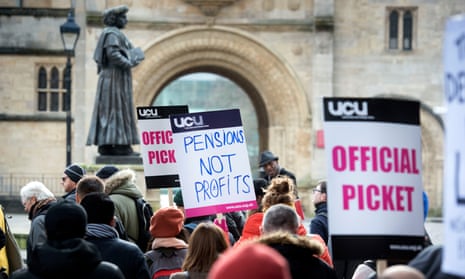The most serious strike disruption to higher education in the history of British universities began on Thursday. Up and down the country academics downed chalk and picketed their lecture halls over a badly handled pensions dispute. More than a million students at 64 universities will be affected. The strikes could extend into the summer, jeopardising students’ final year exams. Like passengers of a grounded airline, students are demanding a refund for the disruption. They may well be successful in exerting their consumer rights: universities last year began paying out for poor services.
The lecturers, and support staff, are striking over a move to change their pensions from defined-benefit schemes to defined-contribution schemes. The former offers the security of a fixed-sum payment whereas the latter is a payout which depends on the performance of underlying investments. The lecturers’ union claims that the changes will leave a typical academic almost £10,000 a year worse off in retirement. This seems a very high price to pay, especially considering that teaching staff salaries have declined in real terms since the financial crisis. In response the universities say they are dealing with a £6bn pension deficit, which if left would mean cuts to spending on teaching, research and jobs. It’s clear that both sides need to return to talks, but that the mindset of universities may prevent that.
University bosses will claim that defined-contribution pensions are the norm for most businesses. That argument, and the universities’ high-handed attitude, explains mostly why things have gone awry. The public see excessive vice-chancellors’ pay while lecturers face low-paid casualised employment. The government wants universities to think like big businesses. They lure students like customers with shiny new labs, luxury accommodation and sports stadiums – amenities built with cash from fees and debt. To make the sums add up, pension liabilities are being offloaded. Higher education attuned to private markets will prioritise cash surpluses over societal wellbeing. What is fading is universities’ public mission and the wider benefits of expanding critical thinking skills, deepening civic engagement and boosting local GDP. In this dispute lecturers could lose some of their pensions. But something more profound is disappearing too.
